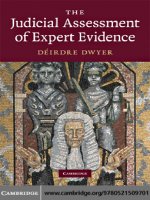0521652502 cambridge university press the american language of rights aug 1999
Bạn đang xem bản rút gọn của tài liệu. Xem và tải ngay bản đầy đủ của tài liệu tại đây (1.08 MB, 282 trang )
This page intentionally left blank
T H E A M E R I C A N L A N G UAG E O F R I G H T S
Richard A. Primus examines three crucial periods in American
history (the late eighteenth century, the Civil War and the 1950s
and 1960s) in order to demonstrate how the conceptions of
rights prevailing at each of these times grew out of reactions to
contemporary social and political crises. His innovative
approach sees rights language as grounded more in opposition
to concrete social and political practices than in the universalistic paradigms presented by many political philosophers. This
study demonstrates the potency of the language of rights
throughout American history and looks for the ®rst time at the
impact of modern totalitarianism (in Nazi Germany and the
Soviet Union) on American conceptions of rights. The American
Language of Rights is a major contribution to contemporary
political theory, of interest to scholars and students in politics
and government, constitutional law, and American history.
r i h r d F p r i m u s studied political theory at Harvard and
Oxford and law at Yale.
ides in ontext
Edited by QUENTIN SKINNER (General Editor), LORRAINE DASTON
and JAMES TULLY
The books in this series will discuss the emergence of intellectual traditions
and of related new disciplines. The procedures, aims and vocabularies that
were generated will be set in the context of the alternatives available within
the contemporary frameworks of ideas and institutions. Through detailed
studies of the evolution of such traditions, and their modi®cation by
different audiences, it is hoped that a new picture will form of the
development of ideas in their concrete contexts. By this means, arti®cial
distinctions between the history of philosophy, of the various sciences, of
society and politics, and of literature may be seen to dissolve.
The series is published with the support of the Exxon Foundation.
A list of books in the series will be found at the end of the volume.
THE AMERICAN LANGUAGE
OF RIGHTS
RICHARD A. PRIMUS
The Pitt Building, Trumpington Street, Cambridge, United Kingdom
The Edinburgh Building, Cambridge CB2 2RU, UK
40 West 20th Street, New York, NY 10011-4211, USA
477 Williamstown Road, Port Melbourne, VIC 3207, Australia
Ruiz de Alarcón 13, 28014 Madrid, Spain
Dock House, The Waterfront, Cape Town 8001, South Africa
© Richard A. Primus 2004
First published in printed format 1999
ISBN 0-511-03303-6 eBook (Adobe Reader)
ISBN 0-521-65250-2 hardback
for Sarah
like everything else
``All of us, grave or light, get our thoughts entangled in
metaphors, and act fatally on the strength of them.''
George Eliot, Middlemarch
Contents
Acknowledgments
page xiii
Introduction
1
1 Rights theory and rights practice
10
2 History and the development of rights
45
3 Rights of the Founding
78
4 Rights and Reconstruction: syntheses and shell games
127
5 Rights after World War II
177
Conclusion: rights and reasons
234
Bibliography
Index
248
261
xi
Acknowledgments
My foremost thanks for help with the project that became this book
go to Michael Freeden, who patiently inducted me into the discipline
of political theory. I am also grateful for the assistance of a host of
other ®ne teachers, including Bruce Ackerman, Bernard Bailyn,
Peter Berkowitz, Eric Foner, Paul Kahn, Sanford Levinson, Mark
Philp, and Adam Swift. Without the bene®t of their skepticism and
suggestions, the ideas in this book would be even less developed than
they now are. I also thank three others who have touched the life of
this book in more diffuse but not less important ways: Guido
Calabresi, Owen Fiss, and Bob Gordon.
There are two other teachers without whom this book could never
have been written. One is H. W. Perry. I have studied constitutional
law with several distinguished scholars since the September morning
when he required me to state the facts of Marbury v. Madison, but his
course remains my image of what a course in that subject should be.
Finally, it is my greatest regret in these acknowledgments that I
cannot thank the teacher to whom, in some ways, I owe more than
any other: Judith Shklar. I believe that she would have disapproved
of much of this project, but I ®nd some consolation in believing that
she would have enjoyed ®ghting with me about it.
The friends who have helped me with and through this book, in
one way or another, are so many that I would risk offending by
omission if I tried to name them all. Nevertheless, the pleasure of
naming names is so great that I accept the risk, hoping to do more
good than ill. I thank Gary Bass, Michael Bloom, Jennifer Bradley,
Niko Canner, Marilyn Cooper, Ariela Dubler, Jonah Edelman, Elie
Fishman, Jesse Furman, Robert Gordon, Eric Gregory, Jay Koh,
Niko Kolodny, Rachel Harmon, Dan Libenson, Sarah Levine,
Meira Levinson, Jack Levy, Laura McGrane, Nader Mousavizadeh,
Brian Reed, Kevin Stack, Jody Seim Timmins, and Rebecca
xiii
xiv
Acknowledgments
Thomas Tingle. I also thank three others who followed by progress
so closely and participated in my thinking so intimately, that I
sometimes wondered how they could have any time or mental
energy left for their own work. They are Noah Feldman, Nien-he
Hsieh, and Kurt Strovink. For their friendship and their intellectual
comeradeship, I am deeply grateful.
Richard Fisher and Elizabeth Howard of the Cambridge University Press provided patient hand-holding as a rough manuscript
became a presentable book. Alan Lord tirelessly accommodated my
demands on his library. I also thank the editors of the Duke Law
Journal and the Yale Law Journal for permission to publish here, albeit
in expanded form, some of the same ideas that I have previously
presented in their pages.
Finally, I thank Aryeh, Lisa, Roni, Ida, Dima, my parents, and my
grandparents. They know why.
R.A.P.
New Haven, 1999
Introduction
This is a book about rights. It is, to be more speci®c, a book about
the place of rights in American political debate. The language of
rights has been central to American political culture for centuries,
and nearly every major issue in American political history has been
argued as an issue of rights. In some circles, however, rights have
recently fallen upon hard times. It has become a familiar refrain in
politics that America is a land of too many rights and too few
responsibilities. In the academy, the concept of rights today attracts
criticism that is both serious and diverse. The critical legal studies
movement charges that a rights-based political order is intellectually
incoherent and morally pernicious, the former because rights con¯ict with one another and the latter because a system of rights
entrenches the power of the privileged classes. Communitarians
contend that framing political debate in terms of rights leads to
excessive individualism, unwillingness to compromise, and the
decline of community spirit. These two schools of thought differ in
many important ways, but their different critiques of rights share the
idea that the substance of American politics is conditioned by the
fact that it speaks the language of rights. To some extent, that
observation must be valid. Because language is often a constituent
element of thought, belief, and action, political activity from legislative drafting to electioneering to international diplomacy relies upon
and is shaped by the language that mediates and helps constitute the
political world. When communitarian and critical legal scholars
argue that speaking the language of rights pushes a political culture
toward some substantive outcomes and away from others, the reality
that language plays a constituent role in politics lends intuitive
appeal to their claim.
That claim, however, underplays two other elements of the
relationship between politics and language. First, the constituent
1
2
Introduction
relationship between them is reciprocal. Precisely because language
and politics are closely interconnected and therefore dif®cult to
analyze sophisticatedly in isolation from each other, it is hard to
imagine language as a separate and antecedent sphere that in¯uences politics while remaining itself untouched.1 Language does
shape politics, but politics shapes language as well. Second, the
in¯uence of language upon politics is not always narrowly determined. Even if speaking the language of rights does distinctively
condition political discourse in America, it does not follow that the
language of rights shapes politics in the speci®c ways that prominent
critics contend. The tendency of rights discourse to favor one set of
political outcomes over another, I suggest, has been widely overstated. As a conceptual matter, people with all sorts of differing
political views can use the language of rights to their advantage.
Such diverse usage is a historical fact, not merely an abstract
possibility: the history of American rights discourse shows that
Americans of all political stripes have in fact used the language of
rights to support their various causes, and all of the greatest political
con¯icts in American history have involved, and been spoken about
as, con¯icts of rights. That these political con¯icts have been
described as con¯icts between opposing rights rather than as
con¯icts between rights on one side and something else on the other
suggests that the language of rights does not attach to only one kind
of political outcome. Instead, either side of an issue can and usually
will use the language of rights in support of its position. Eighteenthcentury Americans who advocated independence from Britain drew
heavily on the language of rights in their political writings, but
Americans who opposed independence were no more loath to use
rights language in their anti-independence arguments. In the nineteenth century, when the issue of slavery split the United States,
abolitionists and Republicans argued their cause in the name of a
whole battery of rights, ranging from the natural rights of people to
be free to the rights of free labor and free speech. Southerners and
slaveholders, however, also marshaled arguments from rights, invoking the right to property and the rights of states. Later con¯icts in
American history featured the right to strike against the right to
work, the right to dispose of one's property in whatever way one
1
I explore these ideas in more detail in chapter 1, with reference to scholars such as W. V. O.
Quine and Quentin Skinner.
Introduction
3
chose against the right to regulate private property in the public
interest, the right to equality against the right of association, the
rights of the federal government against the rights of the states, and
the ``right to life'' against the ``right to choose.'' In short, the
language of rights has not shown itself systematically partisan to any
one political vision at the expense of all others. It has been a versatile
tool, suitable for many different agendas.
It could, of course, be argued that both sides in all of those
con¯icts shared elements of the classical liberal framework and that
the language of rights is useful to all those (but only those) who are
within that political family. Whether all of American politics can be
described as liberal is the subject of a venerable scholarly debate
which cannot be satisfactorily resolved here. I suspect that signi®cant
currents in American political thought can indeed be described as
illiberal and that those currents, like others, have managed to use the
language of rights. For present purposes, however, it is enough to say
that a liberalism broad enough to encompass all major currents in
American politics necessarily encompasses everything, or almost
everything, that is worth studying in American political discourse.
Whether or not rights language can only support liberal ends, it can
and has supported virtually every signi®cant agenda that has been
pursued in American politics.
If it is not true, as both the critical legal scholars and the
communitarians allege, that rights discourse systematically privileges
a certain kind of political outcome, it still might be true that arguing
in terms of rights is not an intellectually coherent way of framing
political or moral debate. After all, the critical scholar might point
out, the litany of con¯icts above suggests that we cannot resolve
issues by reference to rights, because rights so often con¯ict with one
another. There is a sense in which that critique is well made. It is
true that rights con¯ict, so it is true that asking which side in a
dispute is the possessor of applicable rights will not always yield a
clear resolution to the dispute. It does not follow, however, that the
language of rights is an incoherent way of talking about political
issues, because con¯icts among rights raise problems only if one
believes that we should be able to settle substantive questions by
reference to rights alone. In other words, the charge that rights
language is an insuf®ciently good adjudicatory framework is signi®cant only if one assumes that the sole or highest function of rights
language is adjudicatory. That assumption is common, ironically, to
4
Introduction
the liberal theorists who would use rights as means of adjudication
and the communitarian and critical legal scholars who object that
rights discourse is inadequate as an adjudicatory framework.
The language of rights is, however, at least as much about rhetoric
and re¯ection as it is about adjudication. Rhetoric is one of the
obvious ways in which language and politics come together, and,
considered as a species of political rhetoric, the practice of rights
discourse is entirely coherent. As I argue throughout this book,
analyzing rights discourse as a form of political rhetoric exposes
patterns that leave the meanings of various rights claims more clear
than they would otherwise be. There is a gap between the common
literal understanding of statements like ``I have a right to privacy''
and a different set of meanings that the statement carries, meanings
that say more about the political values of the speaker than about an
objective moral or legal order and which may be all the better for
the refocusing, given the real de®ciencies of rights discourse as a
means of describing such orders. Not all uses of rights language are
merely rhetorical, of course: careful re¯ections of judges and scholars
concerned with rights often differ in character from the assertions of
agitators and political skirmishers. Accordingly, the rules governing
the uses and best interpretations of rights language are not rigidly
identical for all circles of discussion. But no sharp line divides
jurisprudence or political philosophy from politics itself. Indeed, the
best way to understand even the self-conscious rights philosophy of
sophisticated liberal theory is not as abstract philosophy alone but
also as political discourse.
Not only does liberal rights theory have a political aspect, but its
uses of rights language are politically powerful. One reason why the
liberal theorists who use the language of rights are likely to defeat
their critics on the ®eld that really matters ± that is, the ®eld of
politics ± is precisely that they use the language of rights rather than
deconstructing it. In the world of American political discourse, a
strong claim of rights, any rights, tends to overpower a subtle
intellectual argument about the shortcomings of rights as a concept.
When I say that the political ®eld is the ®eld that matters, I say
nothing with which those critics should disagree. Critical legal
studies has long insisted that philosophy is inescapably political, and
communitarian thinkers generally argue, in an aspirational vein,
that the philosopher should strive to bring philosophy and politics
together. It is ironic that many of those who most explicitly argue for
Introduction
5
the nexus between academics and politics cannot or do not use the
political value of academic discourse as effectively as the liberals
whom they critique. That pattern is especially characteristic of the
critical legal scholars. Some communitarians, in contrast, have
shown themselves more able to use the language of rights when it is
useful to advance their political arguments, irrespective of the fact
that communitarianism also contains a strong strain critical of rights
discourse.2 Their willingness to use the language of rights greatly
increases the possibility that their political arguments will be persuasive to American audiences, and indeed communitarian ideas are
now ascendant in American political discourse. Using the language
of rights may dilute communitarianism's intellectual distinctiveness,
but it also contributes to the political potency of its platform.
Similarly, the recent critical race theory movement in American
law schools tries to support its political agenda by adding an
af®rmative view of rights to the critical legal studies paradigm. It is
not yet clear how, if at all, a legal theory can coherently merge the
deconstructive posture of critical legal studies with the celebration of
traditionally conceived notions of rights. My own suspicion is that it
cannot be done, at least not from a purely philosophical perspective
which judges theories by their intellectual consistency. Critical race
theory, however, is avowedly political, measuring its success not just
by those abstract philosophical standards but also by the concrete
results it can achieve for its vision of society.3 Just as the rightsaf®rming communitarians have helped make communitarianism a
more signi®cant political force, the use of rights language by critical
race theorists may make them more powerful political players than
their critical legal studies predecessors. In both cases, the uses of
rights language raise questions about how much of a scholarly
discourse should be understood as different from political rhetoric
and how much should be interpreted in the ways appropriate for the
analysis of everyday political claims.
This book, then, analyzes how politicians, lawyers, and philosophers in the United States have actually used the language of rights.
Rights discourse, I argue, should be understood as a coherent social
2
3
Compare, for example, the attitudes toward rights of more politically engaged communitarians like Amitai Etzioni with those of more philosophical communitarians like Michael
Sandel.
On critical race theory's framework and goals, see Angela Harris, ``Foreword: The
Jurisprudence of Reconstruction,'' California Law Review 82, 741 (1994).
6
Introduction
practice, available to a wide range of political agendas and including
within its scope the political argument of philosophers as well as
politicians, though more sophisticated in some contexts than in
others. At the crudest level, Americans often claim the satisfaction of
any needs or interests they consider important and deserving of
special protection as ``rights.'' These claims are limited in only two
ways. First, ``rights'' is an umbrella term encompassing entitlements,
liberties, powers, and immunities, concepts that will be explicated in
chapter 1. Second, ``There is a right X'' means approximately ``X is
important and should be protected.'' No other principle, formal or
substantive, underlies all the claims of rights that Americans advance
or even accept. This understanding of what it means for something
to be a right might seem rough and permissive, but it does capture
the way that the concept of rights actually operates in much of
American politics.
In more disciplined rights philosophy, rights are often the conclusions or waystations of an argument rather than raw normative
declarations. Theorists who think about rights in a justi®catory way
recognize that they must give arguments for why certain things
should be rights and that those arguments should not be reducible to
emotivism, and theorists who reason in what is now called ``re¯ective
equilibrium,'' revising in turn a set of tentative principles and
tentative implications until a desirable system is found, can have
``rights'' stand in on either side of the ledger. Rights so conceived are
revisable working constructs rather than ontological truths.4 It is not
the case, however, that these sophistications make the patterns of
academic rights discourse wholly different from the cruder rights
discourse of simple advocacy. More re®ned versions of the same two
rules described above do in fact capture the way the concept
operates in much of political philosophy. The four categories named
in the ®rst rule bound academic as well as non-academic rights
discourse; one difference between the discourses is that many
academics as well as judges are loath to use ``rights'' indiscriminately
across the four analytic categories, preferring to restrict rights to one
or two among the four. Many also try to narrow the second rule,
developing theories ostensibly aimed at giving more speci®c content
to rights than ``X is important and should be protected.'' Both of
those projects, however, have political undercurrents, because both
4
The idea of re¯ective equilibrium is discussed further in chapter 1.
Introduction
7
have the effect of limiting the rhetorically powerful category of rights
to a subset of the propositions that it might be used to support.
Theorists with different political commitments tend to produce
different formal conceptions of rights which, in turn, support the
different commitments that suffuse the formal theories. Deciding
which formal conception of rights is best can therefore be much the
same as deciding which set of substantive political commitments is
best. In other words, even sophisticated arguments about rights are
frequently surrogates for arguments about the substance of politics.
To try to settle political questions by reference to theories of rights is
problematic at best, because theories of rights do not supply
evidence of an order prior to and regulative of politics. They are
part of what is contested in political discourse, and the student of
politics can learn a great deal about the commitments of political
actors, including political philosophers, by analyzing how they use
the language of rights.
Not only do formal conceptions of rights re¯ect substantive
political commitments, but the substantive political commitments
they re¯ect change in response to changing historical conditions.
Characteristically, the change has been reactive, as people respond
to a new set of problems by articulating a new set of rights. I say
``reactive'' rather than ``adaptive'' because the major pattern of
development in American rights discourse has been one of concrete
negation: innovations in conceptions of rights have chie¯y occurred
in opposition to new adversities, as people articulate new rights that
would, if accepted, negate the crisis at hand. In the ®rst years of the
American republic, for example, conceptions of rights were frequently grounded in opposition to the British colonial administration. In the nineteenth century, political and judicial conceptions of
rights in the American North were often framed in opposition to the
slave-labor system of the South. During and after World War II,
Americans participating in every kind of rights discourse from the
crudest to the most re®ned rethought the content and form of rights
in ways inspired by opposition to European totalitarianism and
especially to Nazism. At the end of the twentieth century, the rights
discourse of American law, politics, and political philosophy bears
the mark of all of these in¯uences. Thus, when the substantive aims
of rights discourse change, new rights and sometimes new theories of
rights arise to carry the content of the new political commitments.
Moreover, the relationship between the substantive commitments
8
Introduction
and the formal, conceptual aspects of rights theory is reciprocal:
after new crises shape new commitments and new commitments
shape new approaches to rights, linguistic and conceptual elements
of the new approaches to rights can in turn help shape substantive
political commitments.
The language of rights, then, is a powerful and coherent method
not just of re¯ecting but also of privileging substantive political
commitments, a method suitable for an extremely wide variety of
ends and regularly employed by academics, politicians, lawyers, and
virtually everyone else who argues about political issues. And yet,
rights discourse has failings. Notably, as the coming chapters will
illustrate, it frequently permits obfuscation in political debate,
because claims of rights often enable bare assertions to pass as
reasoned arguments. Perhaps that very feature, clearly a shortcoming from a rationalist point of view, explains part of the lasting
appeal that rights discourse has held in American politics. Because
rights language offers advocates the possibility of presenting assertion as argument, people more concerned to advance a substantive
set of political ends than to illuminate a philosophical question are
often well served by harnessing the language of rights. Such
advocates sacri®ce precision of thought, and they expose themselves
to the charge that their arguments cannot, in the end, be grounded
in anything outside their own political commitments. But that is no
more than to say that their politics are rooted in their politics, which
may be the case already.
There is here a temptation to say that this problem of circularity
should be avoided by not permitting rights language to obfuscate
debate and instead insisting that the true grounds underlying a claim
of rights should be considered and argued about directly. If one
theory of rights relies upon a strong notion of individualism and
another on a normative conception of nature, perhaps it would be
better to decide con¯icts between them not by arguing about rights
but by asking about individualism and nature directly. Unfortunately,
it would then be necessary to look for the grounds of individualism
and naturalism, and, having grounded those concepts in yet other
concepts whose grounds would have to be sought in turn, we might
soon question what we really meant when we said we were looking
for the ``true grounds'' of the normative argument in the ®rst place.
Clifford Geertz told a now-famous story about being confronted by
a man who denied the reigning scienti®c understanding of planetary
Introduction
9
orbits, insisting that the earth is in fact borne aloft on the back of an
elephant. The elephant, he said, was standing on a turtle. When
pressed as to what supported the turtle, he replied that it was
another turtle; in fact, he explained, it was ``turtles all the way
down.''5 Rights are not rights all the way down, but they may not be
standing a step or two from the bottom, either, perhaps because
there is no bottom to stand upon and perhaps because it is unclear
what a bottom would look like if we found one. That rights cannot
be the ultimate justi®catory ground of a normative argument is thus
not a conclusive argument against using rights discourse in politics,
because it may not be the nature of normative theory to yield that
kind of ground. Knowing that rights are not themselves the grounds,
however, does mean that we should be careful not to regard them as
such. That caution is all the more important in a culture like
America, where the language of rights carries substantial rhetorical
power. And it should be applied to the discourse of philosophers and
judges who think re¯ectively about rights as well as other kinds of
political actors whose theories are thinner, because philosophers and
judges are partly political rhetoricians, perhaps inescapably so.
Language and politics come together for them as well as for others,
shaping their theories of rights.
5
Clifford Geertz, The Interpretation of Cultures: Selected Essays (Basic Books, 1973), pp. 28 ±29.









